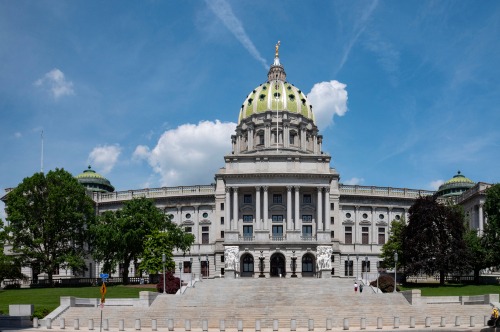
Several bills designed to simplify the tax code for Pennsylvania residents and small businesses were approved by the Pennsylvania House of Representatives this week.
House Bill 199, HB 285 and HB 333 each passed the House of Representatives on Tuesday and now head to the Senate for consideration.
“Small businesses have a track record of being Pennsylvania’s job creators and economic engines. But they have been devastated by pandemic-related closures and supply chain disruptions,” PA House Majority Caucus Chairman Rep. George Dunbar (R-Westmoreland). “Simplifying the tax code will be a meaningful way to help them, and Pennsylvania’s overall economy, continue to recover.”
HB 199 addresses property owners who receive royalties for extracted resources by allowing them to account for the percentage depletion of a mine, oil and gas well, or other natural deposits when filing their Personal Income Tax (PIT). That bill makes the state tax code consistent with federal tax laws.
“By making the deduction process consistent with federal regulations, it will be easier to navigate and less cumbersome,” said Dunbar, the prime sponsor of HB 199. “The current system is complicated with confusing red tape and often, property owners just walk away from the deduction. By matching state law to federal law, we are eliminating that red tape.”
HB 285 would permit the deferral of taxation on a lump-sum distribution from Employee Stock Ownership Plans (ESOP). The legislation, sponsored by Rep. Daryl Metcalfe (R-Butler), would put the state on par with the rest of the nation and allow certain business owners who sell stock to an ESOP to defer capital gains taxes collected at the sale of the business.
“The purpose of my legislation is to increase the incentive for family-owned businesses and other employers to sell their business to an ESOP rather than outsiders whose intentions and the fate of current employees are nearly always unknown,” Rep. Metcalfe said earlier this month.
HB 333 would increase small business deductions for the depreciation of machinery and equipment from $25,000 to $1.05 million.
“Thank you to the PA House for your bipartisan passage of a key component of our Propel PA Forward initiative,” the Pennsylvania Chamber of Business and Industry tweeted Tuesday. “Rep. Eric Nelson’s H.B. 333 would provide much-needed relief to job creators looking to reinvest in the Commonwealth. #RestorePA’s Competitiveness.”
Another bill aimed at reducing corporate taxes, HB 1960, remains under consideration in the House Appropriations Committee. Sponsored by Rep. Joshua Kail (R-Beaver/Washington), HB 1960 would increase the Net Operating Loss paid by Corporate Net Income Tax payees from 40 percent to 80 percent over the next four years.
The Pennsylvania Manufacturers’ Association (PMA) said the bills would be an incentive for small businesses to expand and create jobs while modernizing the state’s tax code.
“These pro-growth tax improvements constitute a real investment to allow the private sector to create well-paying jobs and help expand the economy,” PMA President & CEO David N. Taylor said in a recent blog post. “A short-term sacrifice of revenue today can bring about a broader, more-dynamic economy in just a few years.”